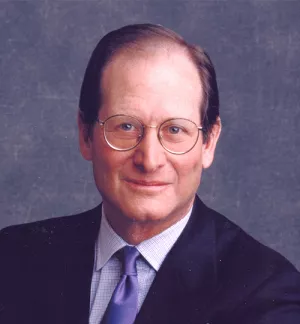When Connecticut Attorney General and Senate candidate Richard Blumenthal said at a 2008 rally that "we have learned something important since the days I served in Vietnam," was he lying intentionally or making an unintentional mistake?
This is the basic issue in an important political story which has mushroomed over the past week. If he was lying intentionally, that would raise questions of character and be an important campaign issue. If he made an unintentional mistake, that would be of far less consequence, especially given 30 years of distinguished public service with exemplary personal conduct (whatever one's views on particular issues or cases).
I have been a friend of Dick Blumenthal's for nearly 50 years (when we were in college during the early 1960s). My personal reaction to The New York Times story was that he had made an unintentional mistake because he is a person of the highest integrity and character and because he is much too smart, on a hot button issue like Vietnam service, to embroider his record intentionally with purported "facts" which could be easily checked. (Further disclosure: I am helping raise funds for his campaign, but this piece is being written without his knowledge or the knowledge of anyone associated with the campaign.)
Yet, many commentators and editorial writers (see critical pieces in The Times, USA Today and The Washington Post) as well as my personal friends, who would normally be disposed to Blumenthal's candidacy, took the "I served in Vietnam" words and angrily concluded that they were intentionally untrue and that he was engaged in purposely misleading conduct.
As I watched the coverage unfold over the week, I was struck at the haphazard and incomplete emergence of "facts" that would inform a judgment of whether Dick Blumenthal had lied or made a mistake. As we all have been reminded many times, this is an era of instant communication and quick draw opinions. It is also one in which trust in public and private institutions and leaders is at all-time lows, and the media and the public are prepared to think the worst on fragmentary evidence.
But, in assessing intent, facts should matter greatly, even if they would have had a hard time this week catching up with impression created by the (way out of proportion and unfair) "World War III" treatment the Times originally accorded the story last Monday -- a story which was based primarily on only one direct "served in Vietnam" quote at a rally two years ago (and which buried an accurate quote from this year's campaign about his reserve service deep in the story).
Here, in my view, are some types of facts which should inform the fundamental judgment about Dick Blumethal's "intent," not at this instant, but when the issue comes back in the campaign, as it inevitably will, and when there is time for the media and thoughtful commentators to assemble a more complete record.
1) What have the official Blumenthal bios said about his military service? The current version at the very end simply says: "He served in the U.S. Marine Corps Reserves, honorably discharged as sergeant...."
2) What have his official campaign materials said, over the years, about his military service? Thus far, there is no claim that he has made his military record a theme of any campaign or that the current materials have talked about "service in Vietnam."
3) In Blumenthal's informal public remarks, were the misstatements isolated incidents or was there a pattern and practice of talking about "service in Vietnam?" The original Times news story and subsequent editorial spoke of "the misleading way he often speaks" and a "larger pattern of misleading voters." But, the "served in Vietnam" type quotes seem to number two or three and come from a tiny fraction of hundreds of meetings or rallies with veterans over many years. In fact, how many times were the untrue words spoken (and at any times in non-veteran settings) and at how many other meetings with veterans did the subject of military service either not come up or was accurately stated?
4) What has been Blumenthal's record on veterans -- and for how long? How substantive and genuine is it? And what kind of support over how many years have various veterans groups in Connecticut given to Blumenthal? Even The Times reported that he has been a staunch supporter of veterans who has gone out of his way to deal with personal problems of specific individuals and who enjoys broad veteran support. Wouldn't his actual record assisting veterans through action be much more important to them -- and the real source of their political support -- than any words expressing solidarity with their problems and circumstances (which is where Blumenthal seems to have, rarely, tripped up)?
5) What is the view of the reporters who have covered Blumenthal over the years about his use -- and characterization -- of his military service. How big a deal was it in his campaigns, and how accurate? A story by The Hartford Courant last week suggests that, based on initial interviews, many of Connecticut's top political reporters do not think he has mischaracterized his service?
6) How does these handful of untrue statements fit into a three decade long career in politics? This would involve an assessment of his (in my view distinguished) public record but also a review the inevitable disputes about facts with his political opponents or the targets of his investigations and enforcement actions.
7) Finally, there is the interesting question of how often the media coverage of Dick Blumenthal gave an incorrect account of his military service (a fact question) and whether he had a duty to correct those stories (a question of appropriate behavior). This turns, in important part, on where in a particular story a media mischaracterization may have appeared (obviously a duty to correct might apply to the lead of a major story and might not apply to a subsidiary paragraph or sentence or sentence fragment in a story on a different subject).
All who have to report complex stories or to make complex decisions know that facts can be illusive, especially under sharp time pressure. But, media outlets and thoughtful commentators should ask and answer these questions to provide a sound factual basis for considering Blumethal's Vietnam statements when they return, as they surely will, to the Connecticut campaign trail in the fall.
Otherwise, the critical issue intent -- of "lie vs mistake" -- will, as it was this week, be uninformed by a more complete and fair public understanding of the facts.
Heineman, Ben. “Blumenthal: Lie or Mistake?.” The Atlantic, May 26, 2010



